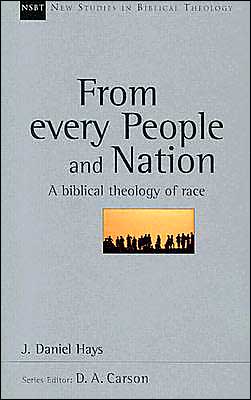

 |

|

The average rating for From Every People and Nation: A Biblical Theology of Race based on 2 reviews is 4.5 stars.
Review # 1 was written on 2020-07-30 00:00:00 Norbert Washington Norbert WashingtonAn exegetically clear and concise biblical theology of race. Hays does not answer every question I have regarding how the church can break down barriers that contribute to segregated churches. He does provide a persuasive argument that the biblical world was far more multi-ethnic and multi cultural and far more comfortable with it than we are. In fact, he argues that an egalitarian multi-ehtnic, multicultural society is what God has always meant for his people. He concludes by showing how this reality is guaranteed and shown in John's Apocalypse. If you want to read the Bible's view of race and His plan to reconcile through Christ then read this book. |
Review # 2 was written on 2020-10-12 00:00:00 Roberto Thegenus Roberto Thegenus2020 reads: 43/52 Rating: 4.5 stars J. Daniel Hays has set out to provide a survey of ethnicity in the Christian canon. After spending some time studying the Cushites, Hays was "startled to notice how much the Bible does actually say about race, and how little White-dominated theological scholarship has acknowledged it." (12) From institutions to systematic theology text books, Hays shows how matters of ethnicity and race are noticeably missing. In contrast to the deafening silence, Hays attempts to offer a "serious exegetically based study of passages that relate to the race issue." (21) Hays proceeds to explain the ethnic make-up of the Old Testament world, looking at ethnic categories and descriptions, tackling the 'curse of Ham', Israel's ethnic make-up, as well the issue of race in the prophets. This is followed up with the ethnic make-up of the New Testament world, as well as a look into race and theology in the NT canon. I must say, the exegetical study yielded some fascinating observations. Here are a couple: 1) there are clear portrayals of Black Africans in the Bible (Cushites, also referred to as Ethiopians'the author prefers the former name). 2) Israel itself was far from being ethnically monolithic and appears to have been a mix of western Mesopotamian, Canaanite, and Egyptian. 3) despite a lot of silence/misreading on this people group, the Cushites were a civilization that stood as one of the major powers in the Ancient Near East for over 2000 years. Many scholars have assumed that any talk of the Cushites referred to a people in slavery, which is totally without historical or textual support; they also frequently aided Israel as allies in attacks throughout Israel's monarchy. 4) Phinehas' (Num. 25:11-3) name literally means, the "Negro", or "Nubian" or "Cushite". Hays writes: "Imagine the different route American Christianity might have travelled if the translators of the King James Bible had known Egyptian and had thus translated 'Phinehas' as 'the Negro'. The early Americans would have read that God made an eternal covenant with 'the Negro', that all legitimate Israelite priests are descended from 'the Negro', and that God credited righteousness to 'the Negro'. With such clear texts available, it would have been extremely difficult to defend slavery or to maintain any type of superiority-inferiority racial views." (84-85) 5) The black Cushites play a symbolic role in the prophets, representing the paradigmatic inclusion of Gentiles into Israel (see Zeph. 3:9-10). 6) If anything, the people group largely absent from the biblical data are white Europeans! Rome itself in the first century was a melting pot of Asian, African and Indo-Europeans peoples. All that is to say, Hays' study casts a severe critique on a lot scholarship that has either ignored the history and impact of the black population or mis-interpreted their presence and significance. The exegesis is careful, neither fanciful or speculative and Hays' call for working toward unity in diversity is admirable and so needed today. Pick up and read! |
CAN'T FIND WHAT YOU'RE LOOKING FOR? CLICK HERE!!!